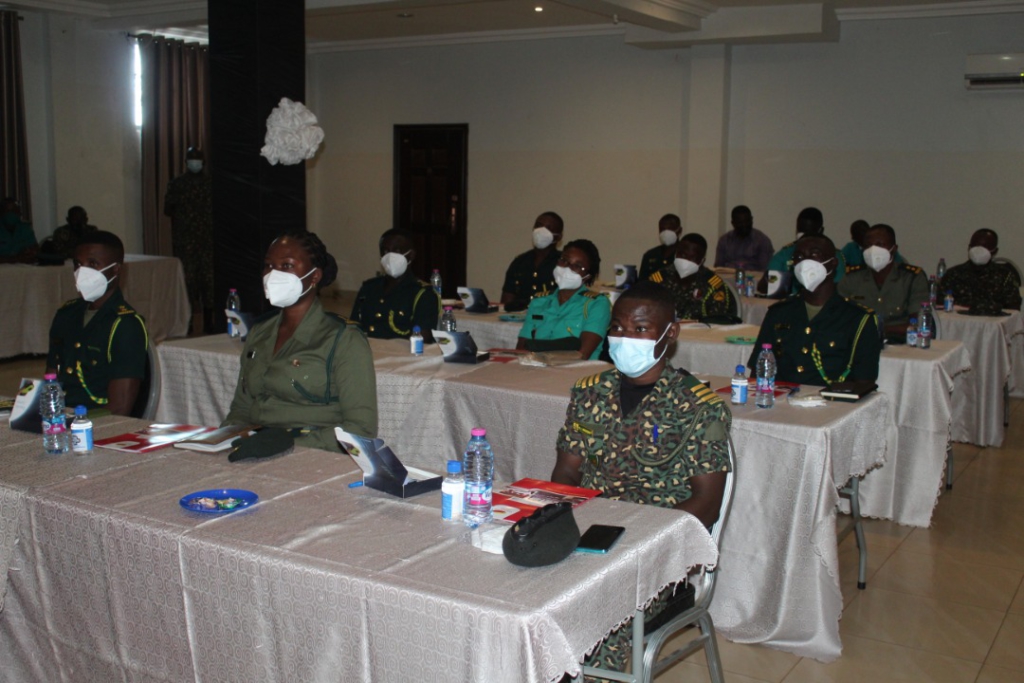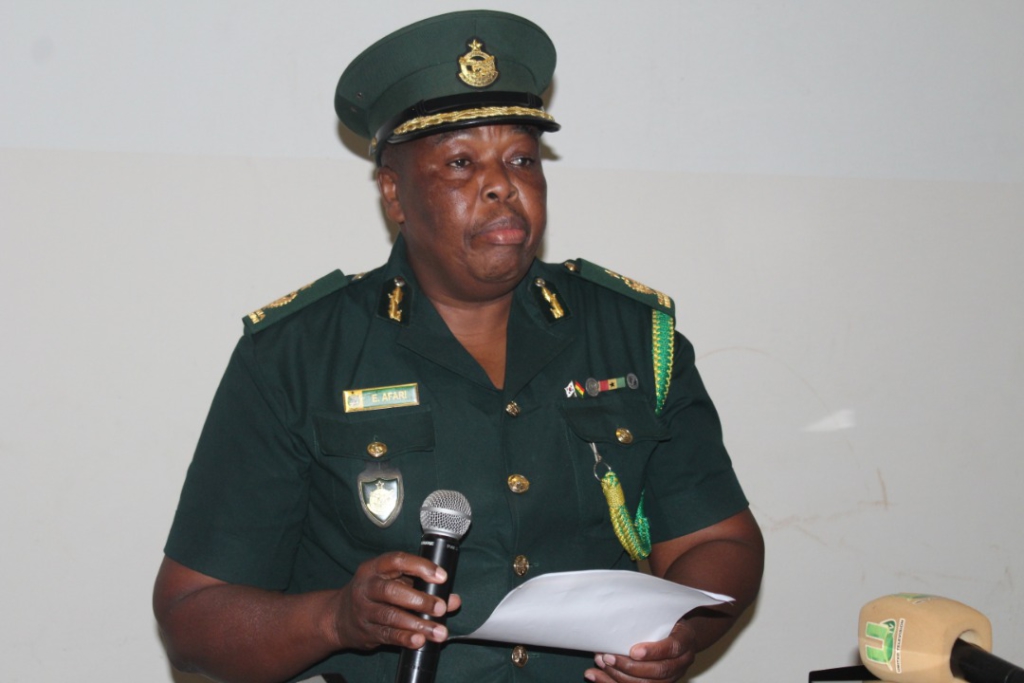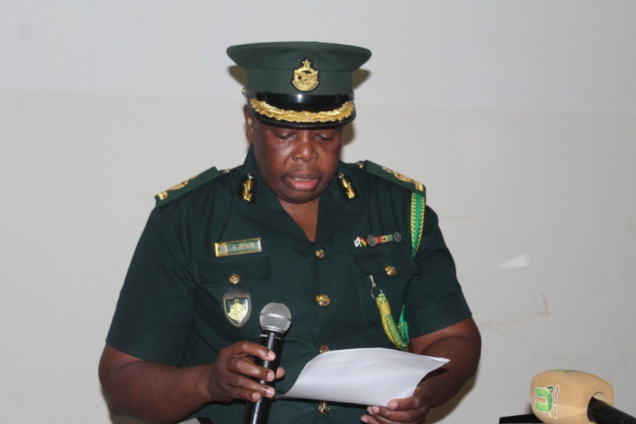Some officers of the Ghana Immigration Service (GIS) in the Bono Region are receiving training in Sunyani to build their knowledge base in document security.
This is expected to enable the officers to execute their mandate well and safeguard the country’s borders.
The participants include immigration officers from the out-stations in the region.
The four-day Document Security/Migration and Health workshop in Sunyani is under the auspices of the Strengthening Border and Migration Management in Ghana (SMMIG), supported by the Strengthening Border Security in Ghana (SBS) projects.
The project, funded by the Government of Denmark and implemented by the International Centre for Migration Policy Development (ICMPD), and the GIS as the beneficiary, is aimed at supporting the Government of Ghana (GoG) in strengthening their institutional and operational capacities to manage irregular migration flows.

Speaking at the opening ceremony, the Bono Regional Commander of the GIS, DCI Eric Afari, said any operational lapses on their part as officers in the performance of their duties, especially along the borders, which remain closed except the airport, will be costly and have dire consequences on the security of the state.
He said as immigration officers, they have to remain vigilant at all times and discharge their duties with the highest level of ethical and professional standards.
With the Migration Information Centers in some strategic locations, including Sunyani, the GIS is enjoined to sensitize the general public on the dangers of irregular migration.
As Ghana’s neighbors have been experiencing recently, DCI Eric Afari explained they have the mandate to protect the frontline against infiltration by transnational criminals, and more importantly, against potential terrorist incursions.
Additionally, “we are to prevent the use of fraudulent documents by a small number of innocent travellers and other criminally minded persons who use technology to create forged travel documents for unsuspecting travellers”, he said.

Given these huge and sensitive responsibilities, officers of the GIS need to regularly update their knowledge on global migration trends and acquire the relevant skills and expertise to ensure effective discharge of their mandate, hence the training.
The GIS Bono Regional Commander assured the participants that “the program has been designed and tailored to fill the capacity gaps in their training architecture as a service, and also to address the key thematic areas of the GIS mandate, as enshrined in their operating laws and related enactments”.
These include security profiling and detection of fraudulent travel documents, sensitization on irregular migration, and health education issues in the face of COVID-19.
He noted the training would also “sensitize the selected officers on the draft GIS Contingency Plan, especially on how to identify early warning signals, health emergency response, and refugees management”.
DCI Eric Afari expressed the Service gratitude to their development partners who sponsored the development of their 5-year strategic plan and continue to fund their programs, including the document security training course across the country.
A representative of the 17 member state international organization, ICMPD, Chief Superintendent Kofi Asano, said their presence in Ghana is to partner with the Government of Ghana (GoG) and its agencies in areas of migration research, dialogues, and capacity buildings to build on the good foundation already laid.
He revealed that the ICMPD, active in over 90 countries worldwide, has over the years, implemented projects like Migration EU Expertise (MIEUX), Support to Free Movement of Person, and Migration in West Africa (FMM).
He noted the European Return and Reintegration Network (ERRIN), Strengthening Border Security in Ghana (SBS), and Strengthening Border and Migration Management in Ghana (SMMIG) are current projects being implemented by ICMPD, with GIS as the main beneficiary.
Chief Superintendent Kofi Asano also said the project seeks to train GIS officers in Document Security at the basic and intermediary levels, adding, “At the intermediary level, 10 GIS officers have been trained and internationally certified as Doc II Experts, about 220 trained at the basic level, while 25 frontline officers are undergoing similar training in Elubo”.
He said, in all, over 300 GIS frontline officers will be trained in basic document security, a knowledge every Immigration officer should have.
Latest Stories
-
I want to be a trailer driver – Viral ‘humble’ trotro mate seeks support to enroll in driving school
16 minutes -
Mahama invites Sahel Military leaders to ECOWAS summit – Ablakwa
25 minutes -
JMJ, Jah Lead hint at new collab after resolving feud
26 minutes -
French jails have come under attack. Are violent drug gangs to blame?
27 minutes -
Guidance and Counselling Association launches counselling body to promote national well-being
35 minutes -
Anlo youth council congratulates newly appointed MDCEs of Anlo state
44 minutes -
Jah Lead apologises to JMJ over threat of assault
58 minutes -
Dickson Adomako Kissi cautions NDC on US-China economic tension
2 hours -
NPP committed to unity ahead of 2028 elections – Richard Ahiagbah
2 hours -
Prophet Atarah opens new studio, launches Atarah Praise 2025
2 hours -
Let’s tread carefully to avoid politicising the removal of the Chief Justice – Nana Agyei Awuah
2 hours -
Film producer Bella Agyemang lauded for box office feat
2 hours -
Ampiah Gilbert, Govina Edmund begin training ahead of 2025 Para Athletics Meeting
2 hours -
Multi-sector collaboration key to strengthening Ghana’s financial literacy framework – Awuah
3 hours -
Majority in Western North, Bono and Volta regions support removal of Chief Justice – Report
4 hours

